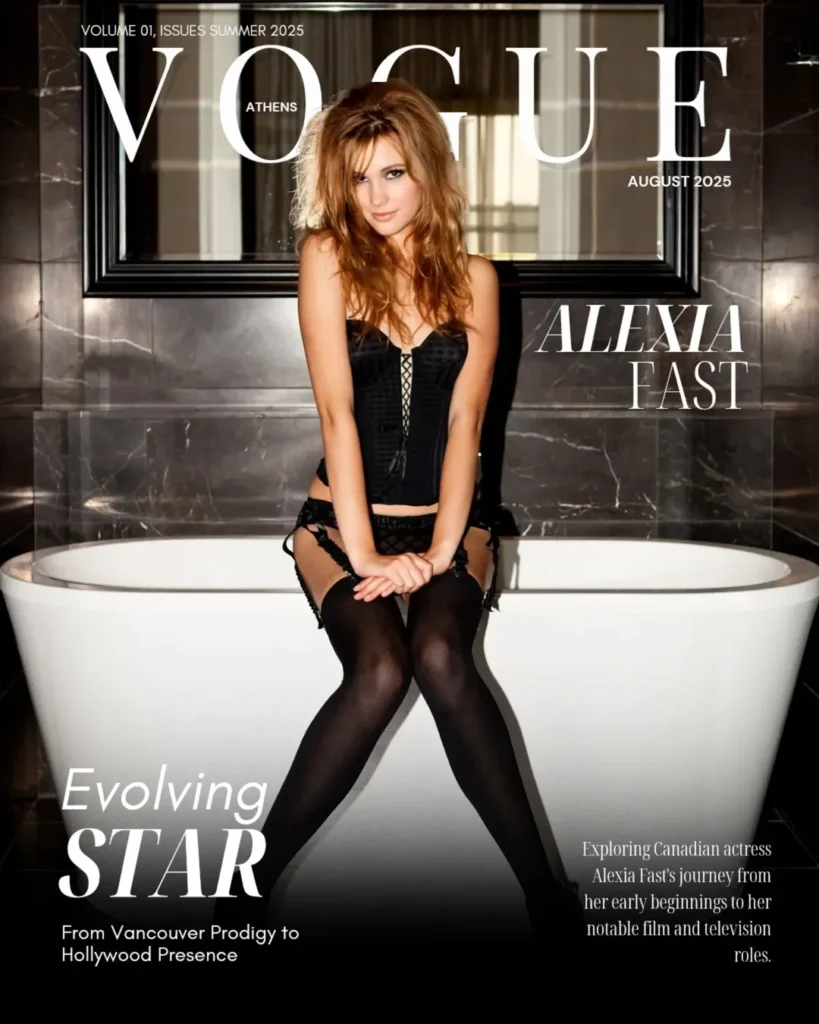First Light: A Childhood With Purpose
Alexia Fast was born on September 12, 1992 in Vancouver, British Columbia. Her home was one where creativity flowed in everyday conversations—her mother worked as a film producer, her father as a songwriter. Early on, the stage wasn’t just a dream; it was waiting. By seven, Alexia had already written, directed, and starred in a short film titled The Red Bridge, and watched it premiere at regional film festivals. That early act of storytelling was a signal—a declaration that she wasn’t going to be a passive performer but someone who wanted to control pieces of the narrative.
When she was eleven, she got her first agent. Not long after came her first feature film role in Fido at thirteen. That performance—playing Cindy Bottoms in a quirky zombie comedy—was far from an audition; it was her introduction. She made visible that her self‑taught instincts were strong, and that she could balance emotional weight even in genre pieces. As a teenager, she won her first Leo Award for Past Tense, a recognition of leading performance that showed she had more than novelty behind her name.
The Landscape of Roles: Choosing Weight Over Spotlight

If many young actors lean toward comfort roles, Alexia Fast steered toward contrast. She ventured into indie dramas, psychological thrillers, genre work, television, and character pieces. She played lead in Triple Dog, traversing adolescent emotional fallout. In Repeaters, she stepped into darker, cyclical stories about time, mistakes, and redemption. Each role pushed boundaries—not for shock, but for depth.
In Helen, Hungry Hills, What Goes Up, she held her own. Then in Jack Reacher (2012), she shared the frame with Tom Cruise. That film marked a turning point: she was no longer solely in the indie/Canadian circuits. She was stepping into global cinema, into bigger budgets, into genres and stories with wider reach—yet still with her signature seriousness. Her characters often have edges: pain, trauma, internal conflict. She doesn’t shy from vulnerability, and she doesn’t glamorize it. It’s real, raw, and earned.
Television & The Wider Canvas: Layering Complexity
While film has been her mainstage, television offered Alexia space to stretch. She appeared in guest roles on shows like Supernatural, iZombie, Red Widow, Motive, among others. But it’s in projects like Manhattan, where she played Callie Winter, that she showed how she handles recurring parts—with nuance, continuity, and evolving emotional arcs.
These TV roles allowed her to build texture: small moments, lingering looks, dialogue that isn’t always about resolution. She’s shown she can anchor tension as easily as release. The canvas is broader, more forgiving, and she uses that to breathe as an actor. Making choices that mix film and television gives her both speed and depth in her body of work.
Awards, Recognition & Turning Points

Alexia has received multiple Leo Awards—her first when she was still very young, distinguishing her among more experienced actors. Later, more wins and nominations followed. These acknowledgments aren’t just affirmations; they reflect how she’s taken every opportunity, risked in genre, drama, indie, and mainstream films, and come out visible. The projects she gravitates toward often contain layers: a thriller might become an existential inquest; a coming‑of‑age plot might double as a meditation on guilt or identity. Her skill is not only to act but to choose.
Taking on The Captive, Grace: The Possession, Blackbird, The Last Mark, Apex—these are diverse pieces, some challenging in emotional stamina, some in character moral ambiguity. They mark her as an actress unafraid of shadows. Many young actors pursue comfort in safety; Alexia seems to seek tension in growth.
Persona Off Camera: Quiet Force & Private Growth
Alexia Fast isn’t a celebrity who thrives on the cameras when not filming. She is known for being reserved about her personal life. Yet from interviews, you get glimpses of someone deeply thoughtful—someone who views acting not just as performance but as outlet, as way to explore flaws, vulnerabilities, and human complexity. She’s spoken about art being therapeutic, about taking on roles that stretch her sense of self, and about how exposure can be both burden and privilege.
She speaks various languages, has worked in both Canadian and international productions, and seems to select projects with both heart and ambition. Her physical presence is striking, but what stands out more is her presence with intention: in tension, quiet scenes, dialogue that demands you lean in. She doesn’t simply act. She inhabits.
The Map Ahead: What’s Possible Next
Given her trajectory, Alexia Fast is poised to do even more. One can imagine her stepping more behind the camera—writing, directing, producing. She’s already shown early interest in filmmaking beyond acting. With her experience, she may choose roles that address more complicated social issues or collaborate with directors known for visual and thematic daring.
She also can bridge indie and mainstream further. More genre work, more lead roles in films that challenge rather than simply entertain. Perhaps more television with depth—limited series or anthology forms that let her play characters evolving across more than ninety minutes. Her audience seems to grow, not through blockbuster exposure, but through trust: trusting her choice of characters, trusting that appearances on screen carry meaning beyond glamour or surface.
Why She Matters: Beyond Stardom, Into Craft

Alexia Fast represents something essential in contemporary acting culture: the actor who builds steadily, invests in challenge, and values integrity over hype. She is a reminder that growth isn’t always measured in tabloid covers or viral moments. It can be measured in the shade of emotion you can pull, in the discomfort you’re willing to embody, in the stories you insist on telling even when the spotlight is dim.
Her career makes one think: of consistency over sensationalism; of depth over breadth; of risk over vanity. And in an entertainment world often obsessed with spectacle, Alexia’s presence feels like a rebalancing—proof that subtlety, resilience, and true craft still carry weight.
Alexia Fast is not yet a household name in every corner, but for those paying attention to performances, to the trembling moments between dialogue, to the quiet breaks when character betrays real feeling—she has become essential. Her journey is far from finished. If anything, she is only just getting started.

